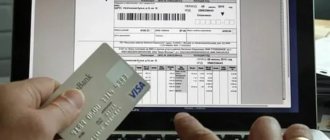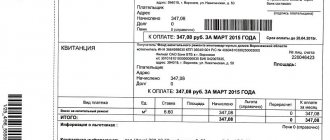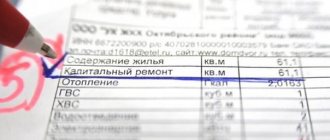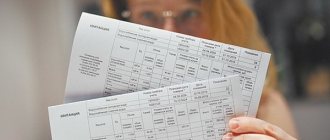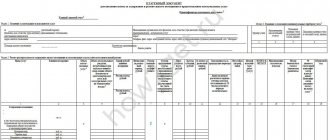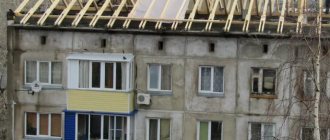The law does not prohibit the purchase and sale of an apartment with debts. Let's imagine a situation: you have found housing that suits you in all respects: price, condition, location. Later it turned out that there was a long tail of debt behind the apartment. Here it is important to understand which debts you will have to answer for, and which legally remain with the former owners.
How to find out the debt for major repairs: on a personal account or without a receipt?
If for some reason you don't know whether payments have been made on major home improvements, or you have intentionally failed to make payments, you need to find out the exact amount owed as soon as possible.
How to find out the debt for major repairs?
- You have the right to contact directly the capital repair fund or the financial department of the management company that services your home and find out about the debt there.
The phone number can be found on the rent receipt or searched on the Internet by entering the name of the organization as a query. - Where can I see the debt for major repairs? Many capital repair funds have their own websites that provide a variety of services, including complete information on debts and payments made by residents .
- Often, management companies, along with rent receipts, send an additional invoice with the amount for major repairs .
If you already have a debt, then this will necessarily be reflected in the receipt .
Where and how to find out and check the debt on contributions for major home repairs?
Encumbrances on an apartment with debts
An apartment with debts may be subject to encumbrances - restrictions on sales and other real estate transactions. This is unlikely to be caused by utility debts, but the very fact of their existence may indicate a difficult financial situation for the seller. It would not be superfluous to check whether the apartment is pledged to the bank, whether restrictions are imposed on the sale due to non-payment of alimony or bankruptcy proceedings.
You can find out whether there are encumbrances on the apartment caused by debts by receiving one single document - an extract from the Unified State Register of Real Estate . The paper will contain the history of the homeowners, its address, cadastral number, area, cost, as well as information about restrictions on sale.
View a sample USRN extract
Information about encumbrances will be available in the statement “On characteristics and rights”, the cost of which is 200 rubles. In addition to information about the pledge and the ban on re-registration, it includes characteristics of the property, information about the current owner and cadastral value. By the way, the extract will reflect not only the fact of the restrictions, but also information about who imposed them: bailiff, bank, tax office, etc. In the full extract, you will be able to get a complete history of the owners with the dates of transfer and termination of rights.
You can receive your statement within a few hours. By indicating the address or cadastral number of the apartment on the website or in the EGRN.Reestr . You can pay for the service in any convenient way.
The received extract will be certified by the electronic signature of Rosreestr. This means that it can be sent to a bank, court or other government agency, which will accept it as if it were a paper document with a seal.
If you see restrictions on the sale in the statement (except for a mortgage ), it is better to refuse the transaction or contact a lawyer. After all, this may lead to the fact that the transaction simply will not be registered or will be challenged in a few years.
What is the judicial practice regarding the collection of debt for major repairs?
It is not possible to “disown” payments, since federal law states that this is the responsibility of every owner of residential and non-residential premises in apartment buildings.
If you systematically do not make the required contributions, then after 3 months the management company has the right to sue the defaulter .
It is there that the question of whether a debt really exists will be decided, as well as what measures need to be taken in this case.
If you decide not to pay for major repairs, then how to do it legally and on what grounds is described in this article.
Despite the fact that the amounts for major repairs are small, and therefore the debts are within several thousand, the debtors still refuse to pay.
It must be said that the lion's share of claims are satisfied in favor of the Criminal Code .
bailiffs will solve the problem with such tenants . They will visit the willful defaulter to collect the required amount , and if he is not at home, or he deliberately does not open the door, the bailiff will leave a written notice .
The procedure will be repeated until the debtor pays .
Please note that if within 2 months from the date of the bailiff’s first visit, the debt is not repaid , he has every right to do this forcibly and take the defaulter’s property in payment of the debt. Judicial practice on debt collection for major repairs.
Visiting the FRC or HOA
To find out the debt using this method, you need to contact the homeowners association or the Capital Repair Fund. You will need to have a certain list of documentation with you.
It includes:
- a certificate confirming the registration of ownership of housing or another act indicating the person’s ability to use the premises;
- an act by which the identity of the applicant is verified. The best option is if the document contains a stamp indicating registration at the address at which the information is requested.
A citizen who is temporarily or permanently registered in an apartment, or is the owner of the premises, has the right to contact these organizations. The HOA or FRC issues a response to the application on the day of application. The person will need to wait about 20 minutes.
What to do if the debt for major repairs (overhaul) remains from the previous owner?
Few people know that, unlike debts for rent, payments for major repairs that are not made on time are transferred to the new owner. This is quite logical, because you live in this apartment, and not the person who sold it.
Even if you didn’t know about such an article in the Housing Code, it will not exempt you from payments .
Going to court will not help in this case.
Of course, the owner can look like a very decent person and swear that he has no debts.
So how do you find out the debt for major repairs?
In order to avoid getting into a similar situation, before purchasing a home, find out about the presence or absence of debt for major repairs.
But practice shows that in this situation it is best to contact the management company directly, where the buyer will be provided with reliable information.
There are cases when the debts are very small, and their payment will not become a serious burden for the new owner, but there is a possibility that the amount will reach several tens or hundreds of thousands . This once again proves the need to be careful when purchasing real estate.
Does the debt pass to the new home owner or not?
All debts incurred by the previous owners of the property are transferred to the new owners.
This point is recorded in Part 3 of Article 158 of the Housing Code of the Russian Federation
Sometimes there is a conflict between the parties' arguments.
. The reason for this is Article 210 of the Civil Code of the Russian Federation: according to it, utility debts are assigned to the individual under whom they arose.
But in the already mentioned 158th Art. The term “contributions for major repairs” is isolated in the residential complex, therefore, regarding it, the provisions of Article 210 must be applied. GK is not allowed.
Important! Contacting the police or courts is completely pointless: it is the current owner who is legally obligated to pay the required amount.
In view of all that has been said, the following advice is appropriate: carefully study the purchase and sale agreement - it must contain information about the status of the personal account
. In addition, require the landlord to provide a document confirming the absence of debts.
Consequences for non-payment of debt
According to the Izvestia newspaper in 2015, 20% of Russians categorically refuse to make contributions for major home repairs.
Unfortunately, the number of debtors is only increasing.
Of course, the authorities know about this, and therefore tighten control in every possible way.
Those who live on social rent may be deprived of their housing for failure to pay the amount established by law . Such cases are rare, but there are already precedents.
Willful defaulters will have their hot water and electricity turned off and the sewerage system shut off, even if you only owe money for major repairs .
Municipal authorities are trying to deal with debtors in different ways, some common methods include officially published lists of debtors, banners on city streets and advertisements calling for debt repayment, all just to shame defaulters.
Since 2021, some regions have created special committees dealing with debtors for major repairs, and in the future it is planned to tighten measures for debt collection.
Is there an alternative
There are no other payment options for major repairs. But, if a citizen has reasons not to trust the fund, he can use an alternative method of saving money:
| Type of accumulation | Peculiarity |
| Fund operator account by region | The regional operator transfers funds under the program. It is used to identify houses based on their condition and set the amount of fees. This method is installed for those buildings that are already close to emergency conditions. |
| Special account for house residents | The money is kept in the account until repairs are carried out. Residents independently decide what to spend the accumulated funds on. They can negotiate a higher rate for faster repairs or for additional general house needs. |
If residents did not vote on the payment method or there were more votes for the first option, then homeowners pay the receipts and deposit funds into the operator’s account. If the majority of owners have chosen a special account, then residents are approved for this method of making payments. At the same time, residents also receive receipts, they pay for them, but the money is sent to their special account.
To accumulate funds for major repairs, an account is opened in a bank. The owners decide among themselves on what purposes to spend the money. After completing the work, the bank, by order of authorized persons, transfers funds for settlement with the team of workers and with suppliers of building materials.
Who has the right not to pay for major repairs?
, all owners of residential and non-residential premises in apartment buildings, as well as legal entities, are required to pay for major repairs
Only tenants may not pay for this service , since landlords are obliged to do this for them.
However, some owners require that payments be made exclusively by tenants, but this is illegal.
Some categories of citizens have benefits for the corresponding payments, for which the state contributes from 50 to 30%.
These include:
- liquidators of the accident at the Chernobyl nuclear power plant, as well as those who suffered from radioactive radiation;
- WWII veterans and labor veterans;
- widows of WWII participants;
- persons over 70 years of age;
- families with the status of large families, or those in which there is a child with a disability.
All others cannot claim benefits for paying for major repairs Find out in detail who has the right not to pay for major repairs, the amount of compensation and the procedure for registration.
Exemption of the owner from contributions
You can be exempt from paying contributions for major repairs. This is allowed by the Housing Code of Russia.
The owner of the living space is not required to pay if:
- The apartment building in which the owner's apartment is located has emergency status.
A conclusion on this condition of the building is issued in writing by the city municipality. - A citizen's real estate is temporarily seized from him to meet the needs of the authorities - municipal or federal.
What is meant here is that the current owner, while the property is not in his possession, is 100% relieved of all obligations to pay any contributions - be it housing and communal services or major repairs. Housing may be withdrawn under exceptional circumstances, such as the resettlement of refugees, a sharp increase in the number of tourists due to any ongoing events, etc. It is important to note that owners of private housing, as a rule, are not affected. The clause applies primarily to hotels, hostels, property of developers, etc. - A citizen purchased an apartment in a recently commissioned building.
Depending on the legislative specifics of the subject of the Russian Federation, exemption from contributions is valid for 1 – 3 years. It is best to check with the city administration for information. In addition, the developer himself must notify existing owners about the terms of the benefit.
You should know the described provisions in order to plan your expenses wisely and not pay what, by law, does not need to be paid anyway.
Penalties: fines
If there are debts for the corresponding service, a percentage of the fine is charged, which the owner is also obliged to repay.
On January 1, 2021, a new system for calculating penalties came into force.
Interest for non-payment will accrue only from the 31st day the debt arose. If the debt is not repaid by the 90th day, the penalty will be 1/300 of the refinancing daily.
For those who are not afraid of such measures, from the 91st day, the rate will increase significantly and will be 1/130 for each day of overdue payments.
All penalties incurred before January 1, 2021 will have to be paid according to the old system.
